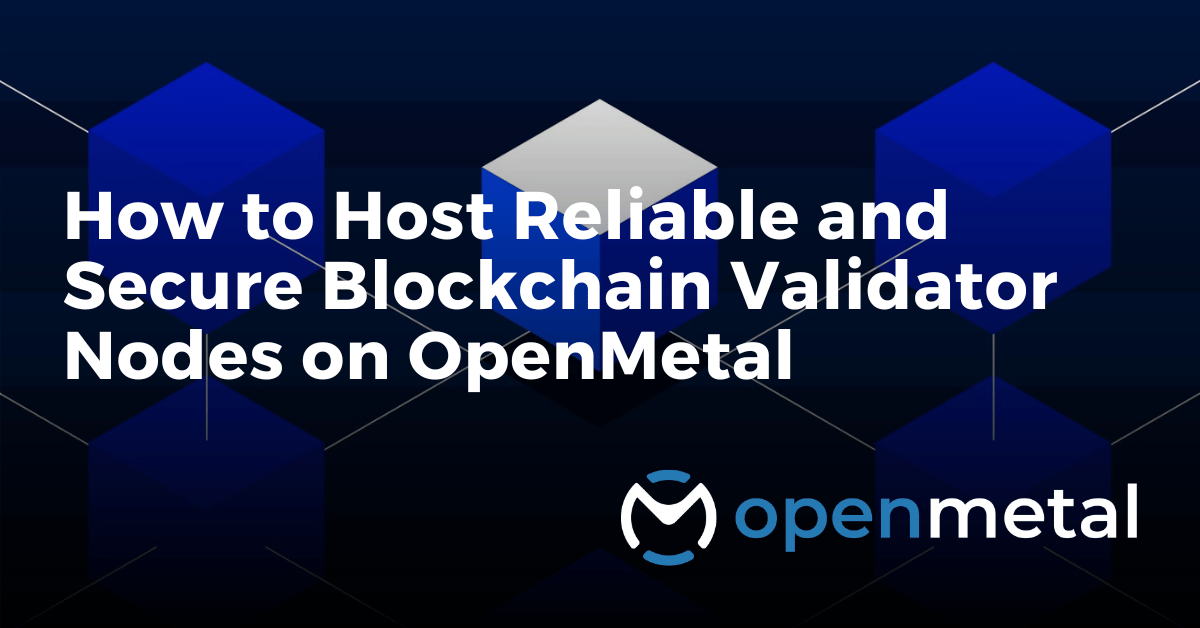
Validator nodes are the backbone of proof-of-stake (PoS) blockchains. They’re responsible for verifying transactions, maintaining consensus, and keeping the network secure. If you’re a Web3 team, staking provider, or infrastructure engineer supporting PoS chains, the reliability of your validator nodes is everything.
In this post, we’ll show you how to host blockchain validator nodes on OpenMetal’s infrastructure platform—built on dedicated bare metal and fully managed private cloud environments powered by OpenStack and Ceph. You’ll see why combining bare metal with open source infrastructure offers the control, performance, and flexibility these workloads demand.
Why Hosting Validator Nodes Matters More Than Ever
Validator uptime directly impacts your stake, reputation, and revenue. Downtime or inconsistent performance can lead to slashing penalties, missed rewards, or even getting removed from the validator set. And with networks like Ethereum, Solana, Cosmos, and Sui growing fast, there’s even more pressure to stay online and reliable.
Too often, validator operators rely on public cloud platforms out of convenience—only to hit performance bottlenecks, inconsistent latency, and even policy bans. For example, some providers have restricted or outright banned crypto-related workloads, causing disruptions across multiple networks.
Technical decision-makers are recognizing that shared cloud instances are not built for the consistency validators require. Validator workloads demand dedicated resources, predictable latency, regional control, and full stack visibility—which is exactly where OpenMetal excels.
Why Bare Metal Is a Better Fit for Validator Workloads
Running validator nodes isn’t a set-it-and-forget-it task. It’s long-running, requires secure network communication, and benefits from tight hardware-level control. Public cloud instances—especially shared virtual machines—can introduce unpredictable variables that are outside your control.
By contrast, OpenMetal’s hosted infrastructure gives you dedicated bare metal hardware with the option to deploy a full private cloud—automated, open source, and ready for production workloads.
- Dedicated compute resources: No noisy neighbors, no surprise throttling. Your validator node runs on its own physical hardware, optimized for consistent performance.
- Low, predictable latency: Consensus timing matters. Bare metal helps ensure reliable network responsiveness—critical for block propagation and attestations.
- Full control over the OS and hypervisor: You get root access to everything. No hidden layers or performance-robbing background services.
- Deployment flexibility: Whether you’re running a single node or a full validator network, OpenMetal makes it easy to scale with hosted private cloud—or stay lean with bare metal.
This is especially valuable for teams running validator, sentry, and RPC nodes together, or across multiple chains. We explore this modular architecture more in our Web3 Infrastructure Use Case.
Infrastructure Blueprint for Validator Hosting on OpenMetal
Getting started with validator hosting on OpenMetal means combining bare metal performance with open-source private cloud orchestration, enabling faster provisioning, stronger isolation, and full control over your validator stack.
Compute
We recommend starting with our Medium V4 or Large V4 Bare Metal servers. These servers provide the RAM, CPU, and I/O capacity needed for most PoS validator workloads, including those that require high-throughput messaging or cryptographic processing.
If you’re running validators for networks with heavier memory demands or parallel workloads (like Solana), consider scaling to XL or XXL V4 instances.
Storage
Many teams pair compute with OpenMetal’s Ceph-based block storage for validator logs, state snapshots, or backups. This enables consistent performance and adds flexibility in how you retain and move data.
Networking
We provide dedicated VLANs and static IPs for easy multi-node communication. With OpenMetal, you’re not tied to the limitations of a multi-tenant VPC. You can build direct tunnels between validators, sentries, or backup nodes across zones.
Security
With root access and isolated infrastructure, you’re in full control of OS hardening, disk encryption, and firewall policies. You can even pair this with Confidential Computing for environments that require hardware-based memory isolation.
Ensuring Uptime, Compliance, and Growth
Validator operators are often part of growing companies, DAOs, or Web3 infrastructure providers who must demonstrate reliability and accountability. With OpenMetal, you get the infrastructure backbone that supports long-term growth.
Our infrastructure is:
- Built for uptime: High-performance storage, multi-site replication options, and professional-grade data centers keep your workloads online—even during surges.
- Flexible by design: As your operations expand into new chains or higher staking tiers, OpenMetal scales with you—without re-architecting.
- Aligned with compliance and control needs: From PCI to GDPR, many networks and their supporting teams require specific controls over data storage and geography. OpenMetal Hosted Private Cloud gives you options to localize infrastructure and meet governance goals.
We go deeper into performance and security balancing in our post on Confidential Computing Performance.
Why Open Source and Open Infrastructure Matter
The blockchain ecosystem is built on open source. So is OpenMetal.
We run on OpenStack, Ceph, and other open-source technologies that align with the transparency and decentralization values of the Web3 world. That means:
- No vendor lock-in
- Full API access
- Compatibility with industry-standard tools
If you’re tired of proprietary limitations and want an infrastructure partner who supports open source at every layer, you’re in the right place.
Final Thoughts: Validator Infrastructure That’s Ready for What’s Next
Your validator infrastructure should be something you can count on—fast, secure, and truly yours. Whether you’re validating for a single network or managing a complex, multi-chain setup, the performance and flexibility of your hosting environment matters.
By choosing OpenMetal, you’re choosing:
- Transparent, open infrastructure
- Dedicated bare metal with zero shared performance risk
- Scalable options for compute, storage, and private cloud
If you’re ready to improve your validator uptime, reduce slashing risk, and stop relying on general-purpose cloud providers, contact us today.
Read More on the OpenMetal Blog



































